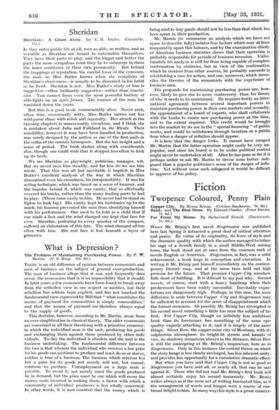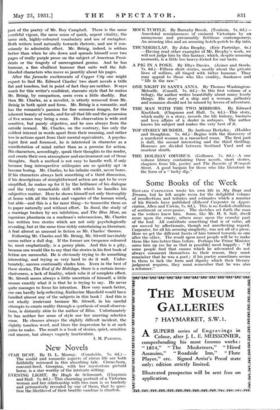F • •
action
Twopence Coloured, Penny Plain
WHEN Mr. Brinig's first novel Singermann was published here last Spring it attracted a great deal of critical attention and praise. By virtue of its originality, its force of style and the dramatic quality with which the author managed to infuse his saga of a Jewish family in a small Middle-West mining town, the book stood out at once from the common nick of novels English or American. Singermann, in fact, was a solid achievement, a book large in conception and execution. In writing it Mr. Brinig put himself immediately on the contem- porary literary map, and at the same time held out high promise for the future. That promise Copper City somehow falls short of fulfilling. It is difficult to say just why. Second novels, of course, start with a heavy handicap when their predecessors have been widely successful. Inevitably expec- tations are dangerously high. Perhaps, in this case, the mere difference in scale between Copper City and Singermann may be sufficient to account for the sense of disappointment which the former occasions. Or possibly Mr. Brinig has attempted in his second novel something a little too near the subject of his first. For Copper City, though an infinitely less ambitious book than its forerunner, has something of the same epic quality vaguely attaching to it, and it is largely of the same things. Silver Bow, the copper-mine city of Montana, with its sulphurous atmosphere, its bright-lit streets and haunts of vice, its shadowy mountains always in the distance, Silver Bow is still the mainspring of Mr. Brinig's inspiration, here as in Singermann. Only in this instance the central theme on which the story hangs is less clearly envisaged, has less inherent unity, and provides less opportunity for a cumulative dramatic effect.
But when you have said that Copper City is not as good as Singermann you have said all, or nearly all, that can be said against it. Those who did not read Mr. Brinig's -first book will almost certainly enjoy his second immensely. Mr. Brinig writes always as if the mere act of writing fascinated him, as if the arrangement of words and images were a source of con- tinual delight to hint. In many ways his style is a prose counter-
part of the poetry of Mr. Roy Campbell. There is the same youthful vigour, the same sense of quick, urgent vitality, the same rich, highly-coloured vocabulary and use of metaphor. Both writers tend naturally towards rhetoric, and use it con- sciously to admirable effect. Mr. Brinig, indeed, is seldom better than when he sits down and spreads himself over two pages of really purple prose on the subject of American Presi- dents or the tragedy of unrecognized genius. And he has humour, a fine ebullient humour that suits well the full- blooded characters who move so jauntily about his pages.
After the farouche excitements of Copper City one might expect to find Mr. Edward Charles' two short novels a trifle flat and toneless, but in point of fact they are neither. It says much for this writer's confident, staccato style that he makes Mr. Brinig, by comparison, seem even a little shoddy. But then Mr. Charles, as a novelist, is utterly removed from Mr. Brinig in both spirit and form. Mr. Brinig is a romantic, and has the romantic's passion for fine sensuous images, for the inherent beauty of words, and for all that life and the possession of five senses may bring a man. His observation is wide and sensitive, but purely objective, and he sees always from the outside inward. Mr. Charles, on the contrary, has only the mildest interest in words apart from their meaning, and rather less in actions apart from their mental equivalents. A psycho- logist first and foremost, he is interested in character as a manifestation of mind rather than as a premise for action. His characters, accordingly, speak their thoughts to the reader, and create their own atmosphere and environment out of those thoughts. Such a method is not easy to handle well, if only because long introspective soliloquies are so quickly apt to become boring. Mr. Charles, to his infinite credit, never bores. If his characters always lack something of a third dimension, if his descriptions of straightforward action are apt to be over simplified, he makes up for it, by the, brilliance of his dialogue and the truly remarkable skill with which lie handles his subjective matter. Here he shows himself not only thoroughly at home with all the tricks and vagaries of the human mind, but able—and this is a far rarer thing—to transcribe them on to paper naturally and without effort. In Sand, the study of a marriage broken by sex inhibition, and The Blue Moss, an ingenious phantasia on a madman's subconscious, Mr. Charles has written two stories which are not only psychologically revealing, but at the same time richly entertaining as literature. A feat almost as unusual in fiction as Mr. Charles' themes.
Following Mr. Charles and Mr. Brinig, Mr. Sitwell inevitably seems rather a dull dog. If the former are twopence coloured he, most emphatically, is a penny plain. And this is a pity, because one would like to say that the stories in his first book of fiction are successful. He is obviously trying to do something interesting, and trying so very hard to do it well. Unfor- tunately, success continually eludes him. Even in the best of these stories, The End of the Holidays, there is a certain incon- clusiveness, a lack of finality, which robs it of complete effect. Mr. Sitwell seems always a little uncertain of himself, a little unsure exactly what it is that he is trying to say. He never quite manages to focus his intention. How very much better, one can hardly help reflecting, Katherine Mansfield would have handled almost any of the subjects in this book ! And this is not wholly irrelevant because Mr. Sitwell, in his careful attempts to create reality through a synthesis of small observa- tions, is distantly akin to the author of Bliss. Unfortunately he has neither her sense of style nor her unerring selective sense. He chooses always the slightly difficult incident, the slightly toneless word, and blurs the impression he is at such pains to make. The result is a book of stories, quiet, sensitive and sincere, but always vaguely inarticulate.
I. M. PARSONS.







































 Previous page
Previous page